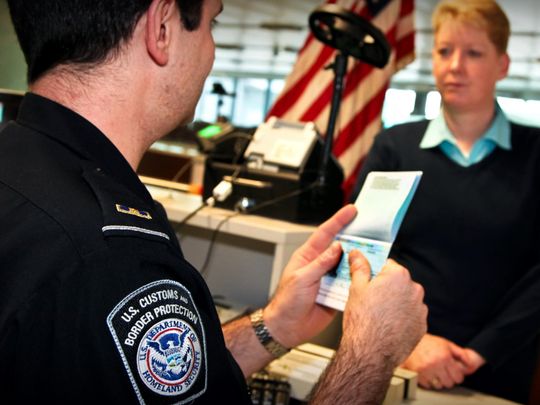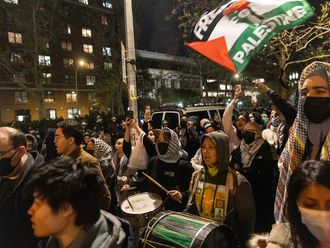
A decision by US immigration officials to bar a young Palestinian scholar, Ismail Ajjawi, from entering the United States on August 23, has earned deserved media coverage. [Ajjawi has now been allowed to enter the US, after the American Embassy in Beirut reviewed his case and issued a new visa.]
Much of the discussion, however, has largely centred around the anti-immigration mindset of the US administration.
While the current US government certainly harbours resentment towards immigrants and refugees, the story of 17-year-old Ajjawi, a resident of Tyre, Lebanon, should also be placed in a different context.
Ajjawi is neither an immigrant nor a refugee, but a Harvard University freshman who earned the Hope Fund undergraduate scholarship from the reputable Amideast non-profit educational organisation. Intelligent beyond his years, Ajjawi was about to embark on a journey of learning to eventually impart his knowledge to the benefit of people everywhere.
Every Palestinian, anywhere, is subjected to restrictions. While some are denied the right to visit their families, others are dying in isolation in besieged areas, in “closed military zones”, while separated from one another by massive walls and numerous checkpoints.
The reason he was denied entry at the Boston Logan International Airport was simply because he is Palestinian.
Despite the setback, Ajjawi told Al Arabiya news channel that he is determined to prove that “Palestinians can succeed and excel despite all the pressure on them”. The young Palestinian wants to pursue a degree in medicine.
While the decision by the US authorities to deny entry to Ajjawi and other Palestinians is consistent with Israel’s aim to isolate Palestinians in every possible way, the recent Israeli decision of barring Omar and Tlaib, US Democratic Representatives, from entering Israel was done on the behest of President Trump himself.
US’ terrifying prospect
Trump had called on Israeli Prime Minister Benjamin Netanyahu in a tweet on August 15 to deny the two representatives entry to the country. “It would show great weakness if Israel allowed Rep. Omar and Rep. Tlaib to visit,” Trump wrote.
That story, too, was read in isolation from the larger context where Palestinians are physically confined and restricted in their movement as a matter of policy, which goes back decades.
The terrifying but real prospect is that the US government is now embracing the Israeli agenda in its treatment of Palestinians and others.
The news cycle pertaining to the denied visit of Omar and Tlaib has moved on to a myriad of other subjects. However, Palestinians will continue to endure protracted confinement and siege.
The Israeli rights group, Gisha, puts this sad reality in numbers. When the Beit Hanoun (Erez) Crossing between Gaza and Israel is not completely shut down, only 3,000 Gazans are allowed to cross into Israel (mostly on their way to the West Bank) per month. Before the breakout of the Second Palestinian Intifada, the Uprising of 2000, “the monthly average number of entries to Israel from Gaza by Palestinians was more than half a million.”
If there is one consistent policy that has governed Israel’s relationship with Palestinians since the establishment of Israel on the ruins of Palestinian towns and villages in 1948, it is that of separation, siege and physical restrictions.
While the establishment of Israel resulted in the massive influx of Palestinian refugees who are now numbered in the millions and are still denied the right to even visit their own homeland, those who remained in Palestine were detained in minimal, cut off spaces, governed by an inhumane matrix of control that only grows more sophisticated with time.
Immediately after the establishment of Israel, Palestinian Christian and Muslim communities that were not ethnically cleansed by Zionist militias during the war endured years of isolation under the so-called Defence (Emergency) Regulations. The movement of Palestinians in these areas were governed by military law and the permit system.
‘Separation Wall’
Following the 1967 occupation of the remaining 22 per cent of historic Palestine, the emergency law was also applied to East Jerusalem, the West Bank and Gaza.
The so-called ‘Separation Wall’, which Israel began building in June 2002, did not separate between Palestinians and Israel, for that has already been realised through numerous laws and restrictions that are as old as the Israeli state itself. Instead, the wall created yet more restrictions for Palestinians, who are now left isolated in Apartheid South Africa-style ‘Bantustans’. With hundreds of military checkpoints dotting the West Bank, Israel’s separation strategy was transformed from isolating all Palestinians at once, into individualised confinement that is aimed at destroying any sense of Palestinian socioeconomic cohesion and continuity.
It does not end here, of course. In March 2017, the Israeli Knesset approved an amendment to the law that would deny entry to foreign nationals who “knowingly issued a public call to boycott the state of Israel”.
Every Palestinian, anywhere, is subjected to these restrictions. While some are denied the right to visit their families, others are dying in isolation in besieged areas, in “closed military zones”, while separated from one another by massive walls and numerous checkpoints.
Now there are early, ominous signs pointing to American interest in the Israeli model. Ajjawi’s story should not only sound the alarm bells among Palestinians and Arab Americans, but also among all groups and communities that are already feeling vulnerable and unwanted by an isolationist administration.
— Ramzy Baroud is a journalist, author and editor of The Palestine Chronicle.









